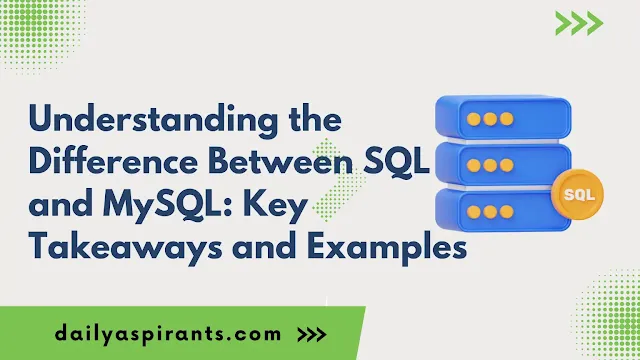In the world of data management and database systems, SQL (Structured Query Language) and MySQL are two terms that often come up. While they are related, they serve different purposes and understanding their differences is crucial for anyone working with databases. In this blog, we'll delve into the dissimilarities between SQL and MySQL, provide examples to illustrate these disparities, and highlight key takeaways for database enthusiasts and professionals alike.
What is SQL?
SQL, or Structured Query Language, is a standardized programming language used for managing relational databases. It enables users to access and manipulate data within a database management system (DBMS). SQL is not specific to any particular DBMS and is widely adopted across different platforms, including MySQL, PostgreSQL, Oracle, and SQL Server.
$ads={1}
Read also:
- Mastering Data Analysis: Essential Skills and Tips
- Best Search Engine Optimization Techniques Revealed
- 16 Best free data analyst course with certificate
What is MySQL?
MySQL, on the other hand, is an open-source relational database management system. It utilizes SQL as its querying language and is renowned for its reliability, scalability, and ease of use. Developed by Oracle Corporation, MySQL is a popular choice for web applications and is used by numerous organizations worldwide.
Differences Between SQL and MySQL
SQL is a Language, MySQL is a Database Management System:
SQL serves as a language for querying and manipulating data in relational databases.
MySQL is a specific implementation of a relational database management system that utilizes SQL as its querying language.
Portability:
SQL is a standardized language that can be implemented across various relational database management systems.
MySQL is a specific database management system that adheres to SQL standards but also incorporates its own unique features and functionalities.
Licensing:
SQL stands apart from typical software products as it's not a tangible entity but rather a standardized language, meticulously defined by both ANSI (American National Standards Institute) and ISO (International Organization for Standardization). This means that SQL isn't confined to a specific vendor or platform; instead, it serves as a universal language framework for managing and querying databases, ensuring interoperability and consistency across various systems and implementations.
MySQL is an open-source database management system released under the GNU General Public License (GPL), which means it's freely available for use and modification.
Examples Illustrating the Differences
Example 1: Basic SQL Query
SELECT * FROM employees WHERE department = 'Sales';
Example 2: MySQL-Specific Functionality
SELECT CONCAT(first_name, ' ', last_name) AS full_name FROM employees;
Key Takeaways
SQL is Universal: SQL serves as a universal language for querying and manipulating data in relational databases, whereas MySQL is a specific implementation of a database management system that utilizes SQL.
MySQL is a Product: MySQL is not just a language but a complete database management system that incorporates SQL for interacting with databases.
Portability vs. Specificity: SQL offers portability across different database systems, while MySQL provides specific features and functionalities tailored to its platform.
In conclusion, while SQL and MySQL are closely related, they serve distinct purposes within the realm of database management. Understanding their disparities is essential for effectively working with databases and choosing the right tools for specific projects and requirements. Whether you're a seasoned database administrator or a novice developer, grasping the dissimilarities between SQL and MySQL can enhance your proficiency in managing and querying relational databases effectively.
